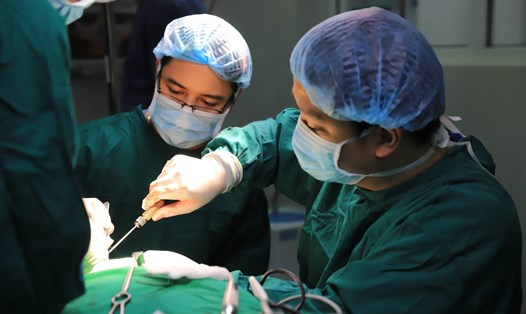Medical practice must meet both professional and ethical standards
According to the new regulations of the Law on Medical Examination and Treatment, from January 1, 2027, graduating doctors will not be allowed to practice immediately but must pass the competency assessment exam organized by the National Medical Council. Other titles such as doctor, nurse, and midwife will be applied from 2028; medical technician, clinical nutritionist, out-of-hospital emergency doctor and clinical psychologist from 2029.
According to Minister of Health Dao Hong Lan, the establishment of the National Medical Council is necessary in the context of international integration, when Vietnam does not have a national exam to issue practice certificates like many countries. This causes obstacles for recognizing degrees and practicing medicine between countries.
The Council will organize a capacity assessment exam according to international standards, as a basis for granting a practice license and creating pressure for medical training facilities to improve quality, avoiding widespread training. Only those with sufficient capacity and moral qualities are allowed to practice, to ensure the safety of patients.
Currently, the country has 214 medical human resource training institutions, including 66 universities, 139 vocational training institutions, and 9 research institutes (doctorate training). The Ministry of Health manages 22 schools and institutes. Every year, nearly 12,000 doctors graduate.
Prof. Dr. Nguyen Viet Tien - Permanent Vice Chairman of the National Medical Council - said that the exam will be organized centrally, applying digital technology to ensure fairness and prevent fraud. In addition to expertise, candidates are also tested on emergency care skills, management and professional ethics. According to the provisions of the Law on Medical Examination and Treatment, every individual practicing medicine must fully meet the requirements for professional competence, which means that there needs to be a standardized assessment tool. However, implementing the assessment at the same time for all people who have been practicing medicine is a big challenge. Therefore, the reasonable step in the immediate future is to focus on assessing the capacity of the group of subjects who have just graduated and are preparing to enter professional practice.
"The competency assessment of new graduates will be conducted by the Appraisal Council through the general exam. Due to the large number of candidates, the exam will use a set of standardized questions, tested on a computer, applying technology to ensure accuracy and objectivity. The exam format is designed to be fair and transparent, limiting fraud even when candidates are sitting next to each other," Prof. Dr. Tien further analyzed.
Medical practice competency test: Effective, no pressure
Associate Professor, Dr. Nguyen Lan Hieu, Director of Hanoi Medical University Hospital, said that the regulation on assessing the capacity to practice medicine before granting a license does not apply to doctors, nurses, technicians... who have a license and are practicing, but is only for medical students graduating from 2027 onwards. Currently, after graduating, doctors have to study for an additional 12 months to practice to be granted a practice certificate (6 months of nursing). This study can take place at provincial or central hospitals, but the results are the same - all are granted certificates without classification in quality. This situation not only creates waste in cost and time but also makes the public wondering about the transparency and fairness of the licensing process.
"Organizing a separate exam to test the capacity of about 10,000 medical students per year, under the supervision of the National Medical Council of 37 members, is very difficult to do. If only taking a theoretical multiple-choice test, it will not accurately assess the nature of the medical profession - which focuses on practical skills.
A more feasible and reasonable solution is to integrate the content of the practice test into the final year graduation exam of all universities and medical colleges nationwide. The bank has proposed a standardized organization, a unified organization form and is directly supervised by the National Medical Council. This approach takes advantage of available resources, saves costs, reduces negative risks and ensures more fairness.
Designing a national standard graduation exam also helps improve the quality of medical training. Schools with poor quality, low passing rate will have difficulty attracting learners and will have to reform or close. This is a necessary screening mechanism in the current context, when medical training schools are flourishing massively. With such an organization, medical students graduating will not have to spend another year without salary to study to get a practice certificate," Associate Professor, Dr. Hieu analyzed.








